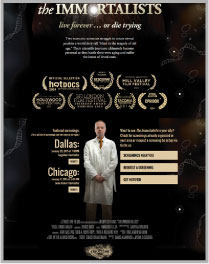 Telomeres are structures at the end of our chromosomes that shorten every time a human cell divides. Each time our cells divide and our chromosomes replicate, our telomeres become shorter. They shorten throughout our lifetime, and when they reach an average of about 5,000 nucleotides, our cells cannot divide any further, and we die of old age.
Telomeres are structures at the end of our chromosomes that shorten every time a human cell divides. Each time our cells divide and our chromosomes replicate, our telomeres become shorter. They shorten throughout our lifetime, and when they reach an average of about 5,000 nucleotides, our cells cannot divide any further, and we die of old age.This problem is because of a telomerase enzyme deficiency syndrome, or TEDS that affects every one of us. If it weren’t for lack of this enzyme our telomeres stay long and healthy. The length of an individual's telomeres is closely associated with their biological age and research suggests that control of telomere length has the potential to treat many diseases associated with aging. Only in the last thirty years science has made real progress in understanding the fundamental question of why we age and what can be done about it. These discoveries have not been widely publicized-‐yet -‐ and so most people are unaware of how close we are to curing the disease of aging once and for all.



 In 1975, Elizabeth Blackburn and Joseph Gall, biologists at The University of Yale, discovered that the telomeres of the ciliate Tetrahymena thermophila consisted of repetitive DNA in a six-base pattern. Follow-up research by Blackburn and Jack Szostak, a geneticist at Harvard Medical School, demonstrated that yeast was able to re-lengthen its telomeres. Blackburn and Szostak theorized that the yeast's telomeres were being lengthened by an unknown enzyme, which would later come to be known as telomerase.
In 1975, Elizabeth Blackburn and Joseph Gall, biologists at The University of Yale, discovered that the telomeres of the ciliate Tetrahymena thermophila consisted of repetitive DNA in a six-base pattern. Follow-up research by Blackburn and Jack Szostak, a geneticist at Harvard Medical School, demonstrated that yeast was able to re-lengthen its telomeres. Blackburn and Szostak theorized that the yeast's telomeres were being lengthened by an unknown enzyme, which would later come to be known as telomerase.